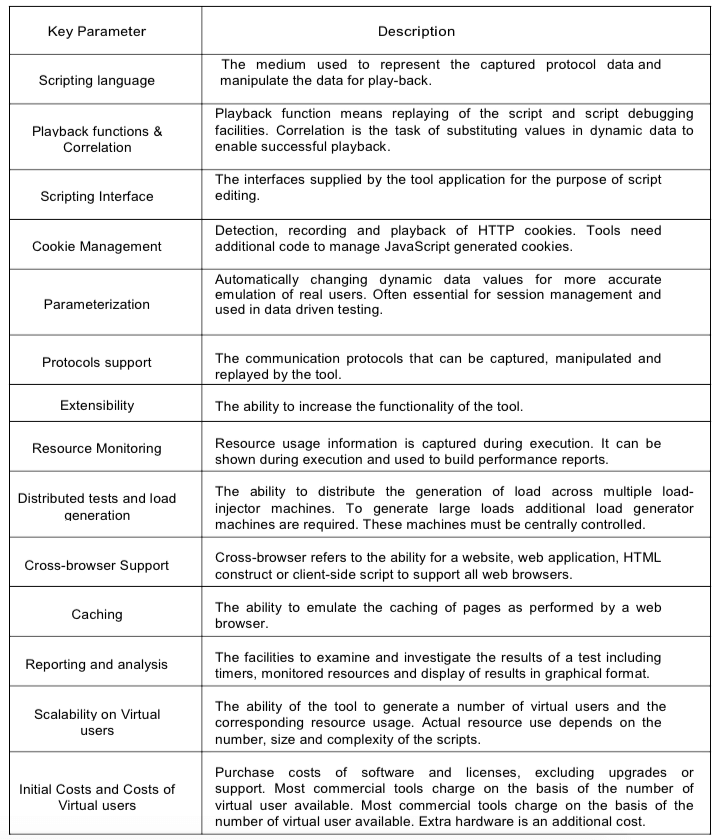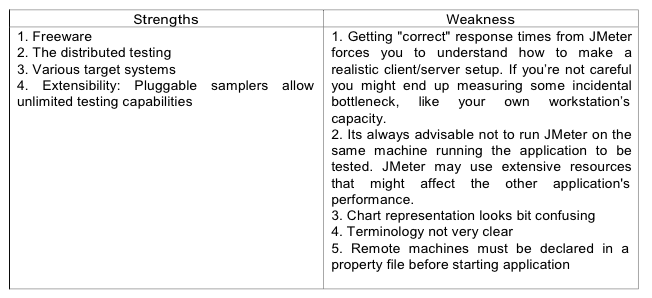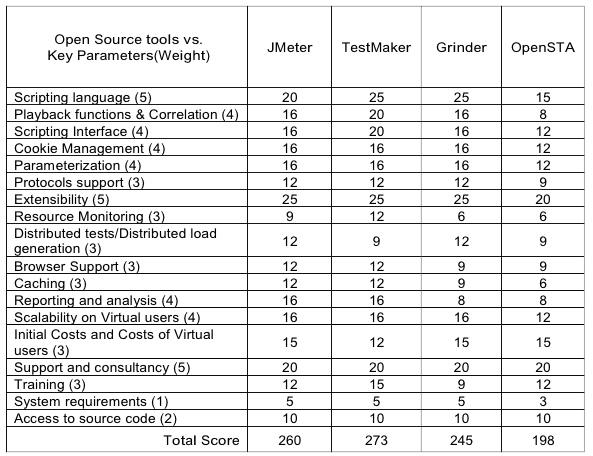Key Parameters Used For The Evaluation


Tool Name: JMeter
Organization: APACHE SOFTWARE FOUNDATION https://jakarta.apache.org/jmeter/
Requirement: Java 1.4 or higher virtual machine on Windows and Unix (Solaris, Linux etc)
Description: Java desktop application from the Apache Software Foundation designed to load test functional behavior and measure performance. Originally designed for testing Web Applications but has since expanded to other test functions; may be used to test performance both on static and dynamic resources (files, Servlets, P-erl scripts, Java Objects, Data Bases and Queries, FTP Servers and more).
Scripting Language: It has support for Java requests and BeanShell scripts. Feature pro/cons:

Tool Name: TestMaker
Organization: PUSHTOTEST https://www.pushtotest.com /
Requirement: Java 1.4 or higher virtual machine on Windows, Linux, Solaris, and Macintosh.
Description: TestMaker from PushToTest.com delivers a rich environment for building and running intelligent test agents that test Web-enabled applications for scalability, functionality, and performance. It comes with a friendly graphical user environment, an object-oriented scripting language (Jython – simplified version of Python) to build intelligent test agents, an extensible library of protocol handlers (HTTP, HTTPS, SOAP, XML-RPC, SMTP, POP3, IMAP), a new agent wizard featuring an Agent Recorder to write scripts for you, a library of fully-functional sample test agents, and shell scripts to run test agents from the command line and from unit test utilities.
Scripting Language: It uses Jython – an open source object-oriented scripting language with a friendly graphical user environment

Tool Name: GRINDER
Organization: A DEVELOPER GROUP https://grinder.sourceforge.net /
Requirement: Java 1.4 or higher virtual machine on any Operating System
Description: Grinder is a GUI desktop application designed to load test functional behavior and measure performance. Grinder uses Jython for defining test. The Grinder is a Java load-testing framework making it easy to orchestrate the activities of a test script in many processes across many machines, using a graphical console application. Three types of processes make up The Grinder:
- Agent processes: A single agent process runs on each test-client machine and is responsible for managing the worker processes on that machine.
- Worker processes:Created by The Grinder agent processes,they are responsiblefor performing the tests.
- The console: Coordinates the other processes and collates statistics.
Scripting Language: Latest version, Grinder 3, uses the powerful scripting language Jython, and allows any Java code to be tested without the need to write a plug-in.

Tool Name: OpenSTA
Organization: OPEN SYSTEM TESTING ARCHITECTURE https://OpenSTA.org/ https://portal.opensta.org/
Requirement: Java 1.3 or higher virtual machine on Windows NT4 only
Description: A distributed software testing architecture based on CORBA. Using OpenSTA (Open System Testing Architecture) a user can generate realistic heavy loads simulating the activity of hundreds to thousands of virtual users. OpenSTA graphs both virtual user response times and resource utilization information from all Web Servers, Application Servers, Database Servers and Operating Platforms under test, so that precise performance measurements can be gathered during load tests and analysis on these measurements can be performed.
Scripting Language: Script Control Language (SCL), uses a proprietary, “BASIC” like language that has special automation scripting facilities.

Conclusion
Jmeter offers some good features and can perform tests on several systems, but it is a little more difficult to use than the other software. It is possible to realize a wide variety of load tests, even to distribute the scenario. However, the application is weaken by the management of Java objects and memory concerns which affect global performance. The major advantage is the possibility to add new features very simply in the application; it is also a good example of modularity and customization.
TestMaker is a powerful tool since the scenario is created with scripts in Jython which allow to use all the Java features. This framework permits to build a customized scenario and very precise test plan, with specific classes. However, its average on the monitoring part and distributed testing is not possible. But it seems interesting to have a look at the classes structure and hierarchy.
Grinder is similar to TestMaker, except that it allows distributed tests, so it can simulate heavy loads. OpenSTA provides some good performances for HTTP testing, with simple charts and distributed tests. It is a good application for simple and reliable HTTP tests.
To summarize the evaluation study, JMeter and Grinder are of Programmer’s tool category and scores more over OpenSTA. TestMaker is an equivalently good tool for Tester’s use.

 Product Engineering Services Customized software development services for diverse domains
Product Engineering Services Customized software development services for diverse domains
 Sustenance Engineering Going beyond maintenance to prolong life of mature products
Sustenance Engineering Going beyond maintenance to prolong life of mature products
 Managed Services Achieve scalability, operational efficiency and business continuity
Managed Services Achieve scalability, operational efficiency and business continuity
 Technology Consulting & Architecture Leverage the extensive knowledge of our Domain Experts
Technology Consulting & Architecture Leverage the extensive knowledge of our Domain Experts
































